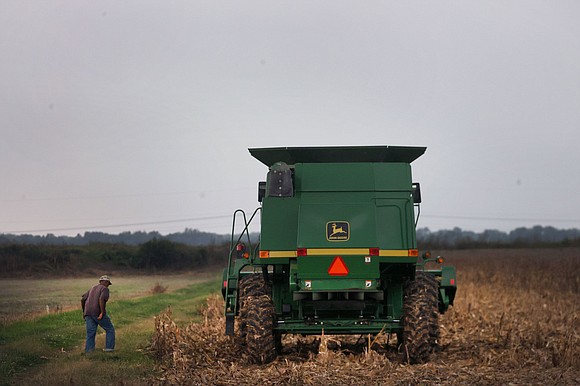USDA commission releases final recommendations to remedy discrimination/inequity across agency
Chandelis Duster, CNN | 2/22/2024, 3:52 p.m.

The US Department of Agriculture’s Equity Commission presented nearly 70 recommendations Thursday that the agency hopes will “further advance equity at USDA” and help resolve longstanding discriminatory practices, according to a copy of the report obtained by CNN.
The commission said the changes outlined in its final report “seek to interrupt the perpetuation of any and all USDA discriminatory and unfair systems, operations, policies and actions.”
It is one of several actions the USDA has taken in recent years to remedy discrimination throughout the agency, including making debt relief available to thousands of farmers whose operations are financially struggling. They have also accepted applications for up to $500,000 in financial relief for farmers who have faced discrimination through its lending programs.
Included in the final report are 66 recommendations, such as:
Creating “a clear and accessible pathway to citizenship for those so essential to American agriculture.” The report also recommends the USDA take steps to ensure fair labor practices and protections for food system farmworkers.
Diversifying county committees – powerful boards made up of elected local farmers who, according to the commission, have not historically “represented their minority farmers and ranchers.”
Making changes to the Census of Agriculture, a 5-year tally of the farms, ranches and people who operate them across the US. The recommendations proposed broadening the definition of who qualifies as a farmer or rancher in the census to account for different types of farming, including subsistence farming and agricultural practices in Native American communities. The commission said the Native farming community believes Census of Agriculture data does not fully reflect the number of Native farmers and could mislead the agency into thinking the community is smaller than it actually is, thus causing them to become ineligible for certain programs.
Supporting legislation to hold USDA leadership accountable to create lasting programs that will improve equity for all.
The recommendations were formally presented by the chairs of the commission to USDA leadership during the agency’s National Equity Summit.
Arturo Rodriguez, co-chair of the Equity Commission, said in a statement that the recommendations reflect “the breadth and depth of the Commission’s background and the communities we represent.”
“I came here to bring the voices of farmworkers to the table, and I leave here with not only an understanding of the needs of other stakeholders of USDA, but the utmost confidence that we will be welcomed to join the table at USDA moving forward as these recommendations are implemented by the Department,” Rodriguez said in the statement.
The report, authored by the 15-person commission and members of two subcommittees focused on agriculture and rural community economic development, seeks to remedy decades-long discrimination against farmers of color.
The commission began examining the USDA’s policies and programs for factors that have contributed to historic discrimination two years ago.
The agency said it is taking steps to fully implement 32 recommendations from an interim report released last February that is included in Thursday’s final report. The agency also said it included the commission’s input for a Language Access Plan, a framework to make it easier for people to access USDA programs and communications in languages other than English.
Ertharin Cousin, a co-chair of the Equity Commission, told CNN the panel has been extended for another year, during which time members and their organizations will also hold regional equity events to discuss priority issues. Cousin also said the commission will not be deterred by attacks on DEI efforts across the country.
“We can’t let that stop us from ensuring that the work that began with this report and with the efforts of the secretary inside the department continue to go forward,” Cousin said, adding that some of the recommendations will require action from Congress.
After receiving the final report Thursday, Agriculture Secretary Tom Vilsack said those who criticize the commission’s efforts to bolster equity and diversity should “take the blinders off.
“Understand that when you provide equity and justice and opportunity to one, you are in essence providing it to all. You are essentially making this country more resilient, a fair and more just place,” he said.
“It is essential for every farmer and rancher and producer that we embrace equity because this country is in a process of transition and change.”







